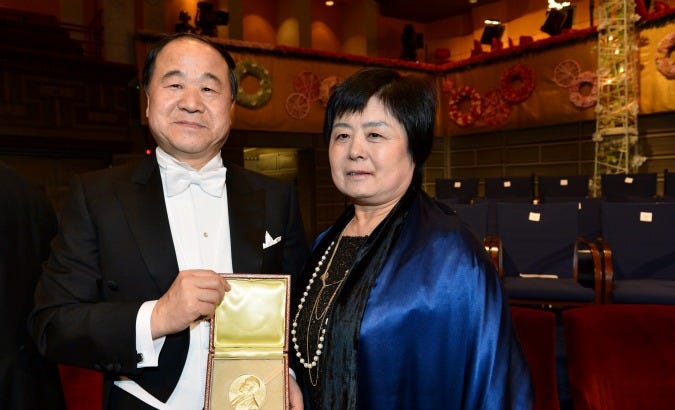6 quotes by Mo Yan, the Chinese Nobel Prize Winner in Literature
Have you already read a book by him? 📚
The holiday season is over, but we should still remember it’s important to relax… with a great book in our hands! 📖
Mo Yan (莫言) was born in 1955 in Gaomi, Shandong Province. His original name is Guan Moye (管谟业), and he is a leading figure among contemporary Chinese writers. His parents were both farmers. During the Cultural Revolution, he dropped out of school at the age of twelve to work in agriculture and later took up factory work. In 1976, he joined the People's Liberation Army, where he began to study literature and write novels on his own.
Mo Yan at the Nobel Prize ceremony. Photo: The Atlantic
"Mo Yan" – "don't speak" in Chinese – is his pen name. The writer explained that the name comes from a warning from his parents not to speak his mind while outside, because of China's revolutionary political situation from the 1950s. In 2012, Mo was awarded the Nobel Prize in Literature for his work as a writer "who with hallucinatory realism merges folk tales, history and the contemporary".
Let’s read some quotes by Mo Yan!
Mo Yan has left a bunch of very meaningful quotes, but here are six that we found particularly poignant:
世事犹如书籍,一页页被翻过去。人要向前看,少翻历史旧账。——莫言《生死疲劳》
旧账 (jiù zhàng) - grievance
Worldly affairs are like books, turned page by page. One should look forward and not dwell too much on old historical grievances.
— Mo Yan, Life and Death Are Wearing Me Out
五十年代的人是比较纯洁的,六十年代的人是十分狂热的,七十年代的人是相当胆怯的,八十年代的人是察言观色的,九十年代的人是极其邪恶的。——莫言《生死疲劳》
胆怯 (dǎnqiè) – timid
察言观色 (chá yán guān sè) – to observe people's expressions and behavior
邪恶 (xié è) - evil; wicked
People of the 1950s were relatively pure, those of the 1960s were extremely fervent, those of the 1970s were quite timid, those of the 1980s were observant of others' expressions and words, and those of the 1990s were extremely wicked.
— Mo Yan, Life and Death Are Wearing Me Out
世界上的事情,最忌讳的就是个十全十美,你看那天上的月亮,一旦圆满了,马上就要亏厌;树上的果子,一旦熟透了,马上就要坠落。凡事总要稍留欠缺,才能持恒。——莫言《檀香刑》
忌讳 (jìhuì) – taboo
十全十美 (shí quán shí měi) – perfect in every way
亏厌 (kuī yàn) – to wane (of the moon); to diminish
坠落 (zhuìluò) – to fall
稍留欠缺 (shāo liú qiànquē) – to leave some imperfection
持恒 (chí héng) – to persevere
In the world, the most taboo thing is perfection. Just look at the moon in the sky—once it is full, it begins to wane. The fruit on the tree, once it is fully ripe, soon falls. There must always be some imperfection in everything to ensure its continuity.
— Mo Yan, Sandalwood Death
世间的万物就是这样,小坏小怪遭人厌恨,大坏大怪被人敬仰。——莫言《生死疲劳》
厌恨 (yànhèn) – hatred
敬仰 (jìngyǎng) – to revere
The world is like this: small badness and small eccentricities are hated, while great evil and great oddities are revered.
— Mo Yan, Life and Death Are Wearing Me Out
但那是历史,历史是只看结果而忽略手段的,就像人们只看到中国的万里长城、埃及的金字塔等许多伟大建筑,而看不到这些建筑下面的累累白骨。在过去的二十多年里,中国人用一种极端的方式终于控制了人口暴增的局面。——莫言《蛙》
累累白骨 (lěilěi báigǔ) – countless bones
人口暴增 (rénkǒu bàozēng) – rapid population growth
But that is history; history only looks at the results and ignores the means. It's like people see the Great Wall of China, the pyramids of Egypt, and other great monuments, but overlook the countless bones beneath these structures. In the past twenty-odd years, the Chinese people have used an extreme method to finally control the rapid population growth.
— Mo Yan, Frog
我做梦也想不到有朝一日这些东西会成为我的写作素材,我当时只是一个迷恋故事的孩子,醉心地聆听着人们的讲述。那时我是一个绝对的有神论者,我相信万物都有灵性,我见到一棵大树也会肃然起敬。我看到一只鸟会感到它随时会变化成人,我遇到一个陌生人,也会怀疑他是一个动物变化而成。—莫言《诺贝尔文学奖颁奖典礼》
朝一日 (zhāo yī rì) – a day in the future
迷恋 (míliàn) – infatuation
醉心 (zuìxīn) – deeply engrossed
有神论者 (yǒu shén lùn zhě) – theist
肃然起敬 (sù rán qǐ jìng) – to feel a deep respect
Even in my wildest dreams, I could not have envisioned a day when all this would be the stuff of my own fiction, for I was just a boy who loved stories, who was infatuated with the tales people around me were telling. Back then I was, without a doubt, a theist, believing that all living creatures were endowed with souls. I’d stop and pay my respects to a towering old tree; if I saw a bird, I was sure it could become human any time it wanted; and I suspected every stranger I met of being a transformed beast. — Mo Yan, Nobel Prize Speech
Which one was your favourite?
Antoine & Dorota







